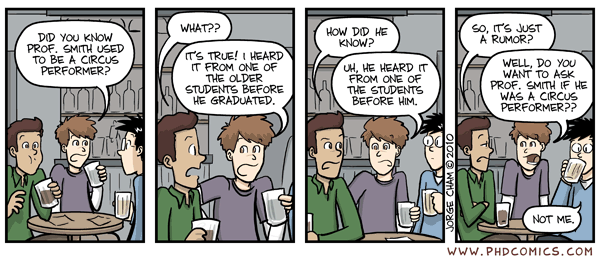
Happy Winter Break, everyone!
We actually made it. I think I was in shock for the first couple of days, but Winter Break is actually here to stay…at least for a couple of weeks. Time to catch up on sleep, see family, and…oh yea, start studying for comps./write those papers you wanted to submit to a conference or journal/start your research for that big project you're planning on presenting/etc. etc.
We actually made it. I think I was in shock for the first couple of days, but Winter Break is actually here to stay…at least for a couple of weeks. Time to catch up on sleep, see family, and…oh yea, start studying for comps./write those papers you wanted to submit to a conference or journal/start your research for that big project you're planning on presenting/etc. etc.
Ah, the life of a grad. student. The work just never ends, does it?
Usually, though, what I find most exhausting over Winter Break is also what I find most enjoyable: catching up with all my friends. You know, those friends that you left behind at home (or, in my case, hid from in my hobbit/hermit hole) for 3 months or so? Trying to see everyone in 3 weeks and still be productive is pretty difficult, and actually succeeding means going back to work and school just as exhausted as you left it.
And, just as exhausting in some ways, is getting in touch with all those friends you’ve missed in the first place.
Do you call them? Do you Facebook them? Do you text them? So many ways to communicate before you can see them in person makes it hard to choose! What’s best? What’s most efficient? After all, we only have a few weeks!
By now, I have a general way of communicating with most people in my life. I know my former teachers who I want to do lunch with mostly prefer phone calls or emails. I know my old college friends usually do texts or Facebook. But, despite this knowledge, it always seems to be harder for me to call my old teachers than the people my age. Why? I feel like I’m more likely to interrupt something important with the teachers (since, unlike you and me, they’re in the real world and all that jazz).
Apparently, this is a more common feeling than I realized. During a recent lecture at Fordham (which no doubt happened while I was buried under a pile or two of books), Professor Deborah Tannen, a linguistics scholar, spoke about the generation gaps that emerge in uses of social media. Of course, everyone knows that, in general, young people text more than older people do. And, when my mother asks me why I’m taking the trouble to type out a question on my tiny phone instead of just calling my friend I have explained that it's “because I don’t want to bug my friend.” But I guess I just never looked at it any deeper than that.
But, when I read the article summarizing her lecture, Professor Tannen’s explanation made complete sense to me. “Young people take a different attitude toward the use of text messages than older generations do,” she explained.‘“My [Prof. Tannen’s] peers tend to view texting with alarm, disapproval and contempt. If we’re talking to a kid and they start texting somebody, it’s uniformly clear to us that that’s rude. [But] Young people consider telephone calls rude. It’s rude and intrusive to call people on the phone. The polite thing to do is to text them.’”
Unfortunately, this explanation does not help me with my internal dilemma. Knowing that millions of others my age feel the way I feel does not help me conquer those feelings; it does not help me feel more comfortable about making that phone call even when calling may be more efficient, and even when I only have a couple of weeks to see everyone I want to see (and, don’t forget, accomplish all the reading I want/need to do).
Luckily, I’m not so set in my ways about this kind of thing that it spills over from my personal life into my professional life. I know my own social media preferences probably don’t work in an office setting. But I’d like to hear more about what Prof. Tannen has to say about this. Is my generation generally able to conquer these preferences when they involve people with other preferences from other generations? Does this answer depend on each person’s level of anxiety or shyness? Have these social media preferences affected the general extrovert/introvert ratio for my generation (and I mean this as a different question than the typical “is social media bringing people closer or flinging them apart?” conundrum)?
I’m sure more research will be done on this kind of thing in the future. For now, for this Winter Break, I guess we’ll all have to figure out how to catch up with our old friends on our own.
Hope everyone is having a wonderful holiday season and, if you’re in NYC, that you’re enjoying the snow!











